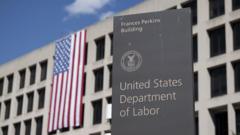Is the US Watchdog Oversharing? Review of Official Data Collection Underway!

Published: 2025-09-10 17:30:10 | Category: technology
The US Labor Department's internal watchdog has initiated an investigation into the Bureau of Labor Statistics (BLS) regarding its methods of collecting jobs and inflation data. This comes in the wake of heightened scrutiny from the White House following revised job figures that revealed weaker growth than previously reported. The inquiry will assess the challenges faced by the BLS in gathering and updating critical economic information.
Last updated: 29 October 2023 (BST)
Key Takeaways
- The investigation was prompted by recent job report revisions indicating a significant downward adjustment in employment figures.
- Concerns have been raised about the potential politicisation of economic data by the current administration.
- Critics have highlighted the impact of funding cuts and staffing reductions on the BLS's data collection processes.
- Past reports have identified issues with declining response rates in BLS surveys affecting data quality.
- The appointment of a new BLS commissioner with a partisan background has drawn criticism from various economists.
Background of the Investigation
The investigation by the Labor Department's Office of Inspector General (OIG) was announced shortly after the BLS issued a revision revealing that the US economy added 911,000 fewer jobs than initially estimated in the year ending March 2023. This adjustment represented a more significant downward revision than many economists had anticipated, raising alarms about the reliability of the BLS's data.
Prior to this investigation, concerns had been mounting regarding the BLS's ability to maintain the quality of its surveys amid declining response rates. These factors have now come under closer examination, particularly as the White House has expressed dissatisfaction with the BLS's reporting.
Political Context and Reactions
Following the release of the revised job figures, President Donald Trump dismissed the head of the BLS, alleging, without evidence, that she had manipulated job numbers to portray his administration unfavourably. This dismissal has amplified fears among economists and political analysts that the administration may be attempting to influence economic reporting for political gain.
Furthermore, the nomination of conservative economist EJ Antoni to lead the BLS has also attracted criticism. Antoni is known for his partisan analysis, which has led to widespread disapproval from both Democrats and some economists who fear that his appointment could further politicise the bureau's data.
Concerns Over Data Collection Practices
The current administration has contended that their goal is to enhance the quality of economic reports and modernise the BLS. However, critics argue that recent cuts to BLS panels that included outside experts and decisions to limit the collection of price data have negatively impacted the agency's operations. Many believe these changes are a result of insufficient funding and staffing, which raise questions about the reliability of the information produced.
Historically, the OIG has scrutinised BLS data practices, with a 2023 report highlighting significant concerns regarding declining initial response rates to surveys. This report concluded that the BLS could improve transparency regarding the limitations of its data and its underlying assumptions.
Implications for Economic Reporting
The ongoing investigation is critical as it may lead to significant changes in how the BLS operates and reports data. If the inquiry uncovers flaws in the data collection process or reveals attempts at political manipulation, it could undermine public trust in economic indicators that inform both policy decisions and public perception.
Moreover, economists have expressed that reliable data is vital for understanding the economic landscape, especially in light of ongoing challenges such as inflation and employment rates. Any perceived bias or manipulation could skew policy responses and impact the broader economy.
The Path Forward
As the investigation unfolds, stakeholders will be watching closely for its findings and recommendations. Should the OIG identify significant issues within the BLS, it may prompt calls for reforming the agency's practices and ensuring that economic data remains a trusted resource for policymakers and the public alike.
In conclusion, the integrity of economic data reporting is crucial. The investigation into the BLS highlights the delicate balance between politics and data integrity, raising essential questions about the future of economic reporting under political influence.
FAQs
What is the BLS and what role does it play?
The Bureau of Labor Statistics (BLS) is a division of the US Labor Department responsible for collecting and analysing economic data, including employment statistics and inflation measures that inform public policy and economic understanding.
Why was the investigation launched?
The investigation was launched in response to criticism from the White House and concerns about the accuracy of recent job data revisions, which indicated a significant downward adjustment in employment figures compared to earlier estimates.
How has the White House influenced the BLS?
There are concerns that the current administration is attempting to politicise economic data, particularly after the dismissal of the BLS head and the nomination of a commissioner known for partisan analysis, raising alarms about the integrity of the data produced.
What challenges is the BLS facing in data collection?
The BLS is reportedly facing challenges such as declining initial response rates to surveys, funding cuts, and staffing reductions, which could adversely affect the quality and reliability of the data it collects.
What are the potential consequences of this investigation?
The investigation could lead to reforms within the BLS, ensuring better transparency and reliability in economic reporting, which is vital for public trust and informed policy decisions.



